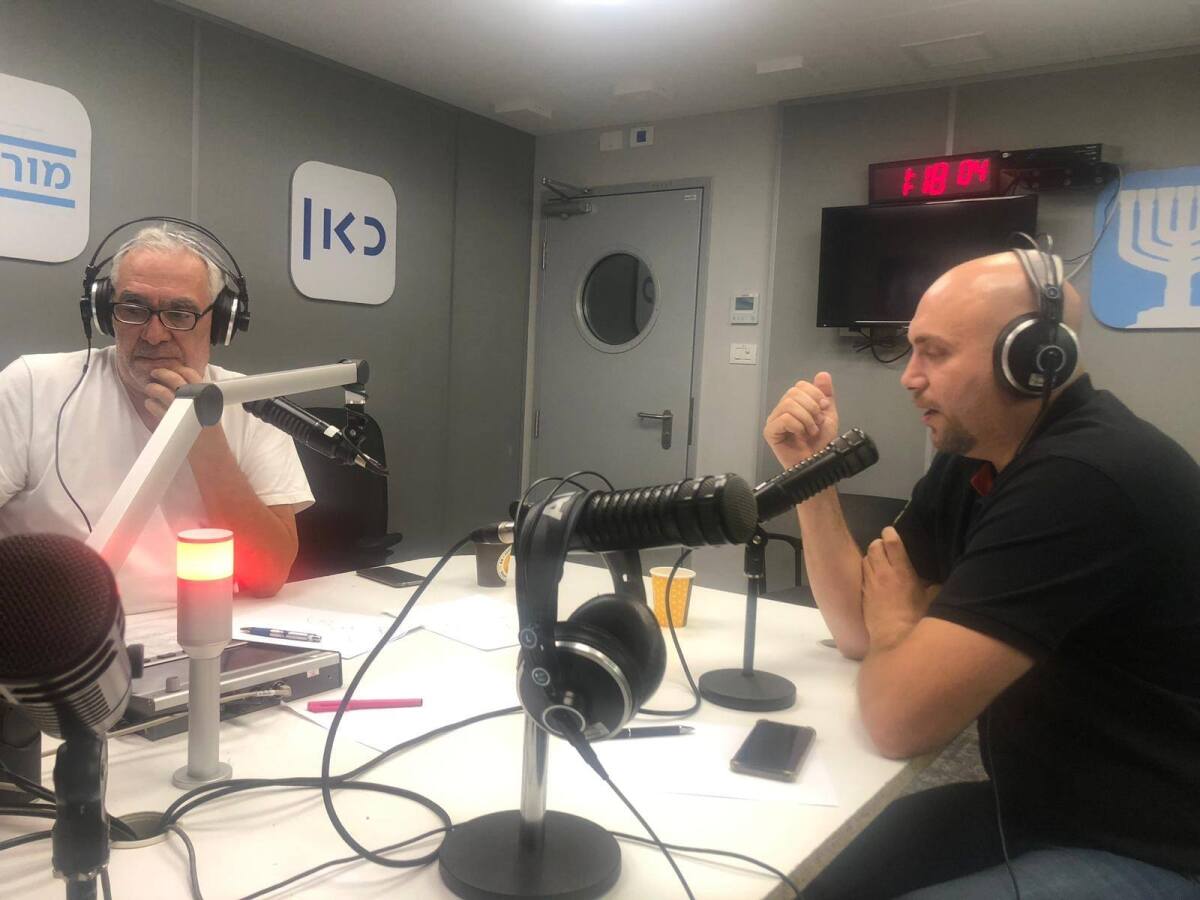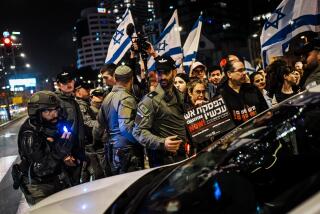A techie pushes back against Benjamin Netanyahu’s anti-Arab rhetoric
A little over a year ago, few people had heard of Afif Abu Much, a mild-mannered software engineer in Israel’s tech hub of Herzliya.
But in the last few months, he has been featured in nearly every political magazine in the country and emerged as a powerful spokesman on the issue of Arab representation in Israeli society.
When President Reuven Rivlin recently signed a charter pledging to eliminate racism in Israel, there was Abu Much again — 6 feet 4, bald and goateed — one of several guests on hand for the ceremony.
The Israeli financial daily Globes recently called him “one of the most confident, prominent and direct voices that has emerged in recent years.”
Arab Israelis, who account for about a fifth of the country’s 9 million citizens, have long been underrepresented in media, business and politics.
Abu Much, 38, has been campaigning to change that, and his message has been resonating among Israeli Jews and Arabs alike during one of the most contentious election seasons in Israeli history.
His rise as a shrewd commentator began on Twitter, which he joined to follow the 2016 U.S. presidential race. By 2018, he was routinely tweeting at Israeli television news channels to protest their omission of Israeli Arab cities from the weather forecasts.
He struck a chord by signing his tweets — nearly all of them in Hebrew — with what has become his trademark hashtag: “recognition_not_exclusion.”
By early 2019, the stations had expanded their weather forecasts.
But bigger problems were brewing. Prime Minister Benjamin Netanyahu announced elections and launched a campaign using anti-Arab rhetoric to rile up his base.
He has repeatedly accused an opponent of conspiring with “terror supporters” — a reference to Arab Israeli politicians.
Abu Much began editorializing on those attacks and the lack of Arab guests on Israel’s raucous prime-time TV political panels — pointing out that when Arabs were invited it was only to discuss “Arab affairs.”
He routinely refers to Netanyahu as “the crook from Balfour Street” — an allusion to the prime minister’s residence and a reminder of his indictment last fall on corruption charges. His trial is scheduled to start March 17.

Last month, after President Trump unveiled a Mideast plan that suggested that the cities and towns in which Israeli Arabs live be transferred to a future Palestinian state, thus stripping them of their citizenship, Abu Much tweeted: “In the end I’ll still be an Israeli citizen and Netanyahu, most likely, will be in jail.”
When Netanyahu’s son, Yair, tweeted Ramadan greetings to “friends in the [Persian] Gulf and in Africa,” Abu Much called him out for excluding Israeli Muslims.
“And what about those who fund your car and driver and your bodyguard?” he tweeted. “The Muslim citizens who pay taxes so that you can go out on Friday night and party with your friends?”
Yair Netanyahu responded by accusing Arab Israelis of dodging taxes while sucking up social security and other benefits from “the state most of you hope to destroy” — before blocking Abu Much on Twitter.
Abu Much also “made history,” as one magazine put it, for bringing town hall meetings with big-name politicians, journalists and entertainers to his hometown of Baqa al Gharbiya.
Such gatherings — known as shabatarbut, a combination of the Hebrew words for Sabbath and culture — are a cornerstone of political life in Israel but had never been held in any Arab city.
When the state of Israel was established in 1948, all the people living there — Jews, Arabs and others — were automatically granted citizenship.
Abu Much, a nonobservant Muslim, grew up solidly middle class. His father owned a CD and video shop. The family spoke Arabic at home, but as a child Abu Much enjoyed poring over the sports pages in Hebrew newspapers his father brought home.
A standout student, he attended the elite Israel Institute of Technology, known as Technion, where he graduated in 2005 with a degree in computer engineering.
As he tells it, his search for a job over the next year was pivotal in helping him understand the extent of anti-Arab discrimination in Israel.
“I went to dozens of interviews,” he recalled. “It made no sense that as a graduate of the Technion, I didn’t get work for a year. During that same period, I noticed that the managers who didn’t hire me had no problem hiring Jewish employees who had zero connection to tech.”
Today he works at Dell. Through mentoring and his connections, he has helped increase Arab representation in Israel’s tech sector, though there is much work still to be done.
“What Arabs want is to be part of this country, to be completely part of it, from the sports fields to the Cabinet table,” he said.
Maisam Jaljuli, director of Standing Together, a grass-roots movement for equality, said Abu Much is doing “very important work.”
“Afif has been very successful challenging Israel’s media mainstream, and he resonates because it’s clear his commitment is total, even though he’s from another world,” she said.
Israel’s Arab voters can be a powerful force. In 1999, an Arab turnout of 75% helped end Netanyahu’s first stint as prime minister.
Both elections last year failed to secure any candidate enough votes to form a government. In April, apathetic Arab voters largely ignored the election, bringing turnout to a historical low of 49%.
In September, Arab turnout rose to 60%, an increase widely attributed to the unified response of Israeli Arab leaders to the prime minister’s anti-Arab smears.
Abu Much said he hopes even higher turnout in the next election, scheduled for March 2, will help defeat Netanyahu.
“Arab voters are the central player in these elections,” he said. “Netanyahu understands this. He’s not just a cynic. It is true his statements are racist, and it is incitement, but the truth is that if we vote at the rate of 65%, he will not remain prime minister, and knows it.”
Abu Much also questioned whether the prime minister’s tactics would draw much support beyond the extreme right.
“Israeli Jews see Arab doctors and Arab pharmacists and Arab cabbies every single day,” he said. “They know this is just electoral hatred.”
Abu Much argues that mainstream parties from the center and the left have yet to consolidate a government because they are not reaching out to Arab voters, many of whom don’t feel at home in the Arab-majority parties.
As for his own political allegiances, Abu Much said he does not belong to any party and refused to divulge how he votes.
“I don’t discuss that,” he said.
Tarnopolsky is a special correspondent.
More to Read
Start your day right
Sign up for Essential California for news, features and recommendations from the L.A. Times and beyond in your inbox six days a week.
You may occasionally receive promotional content from the Los Angeles Times.





